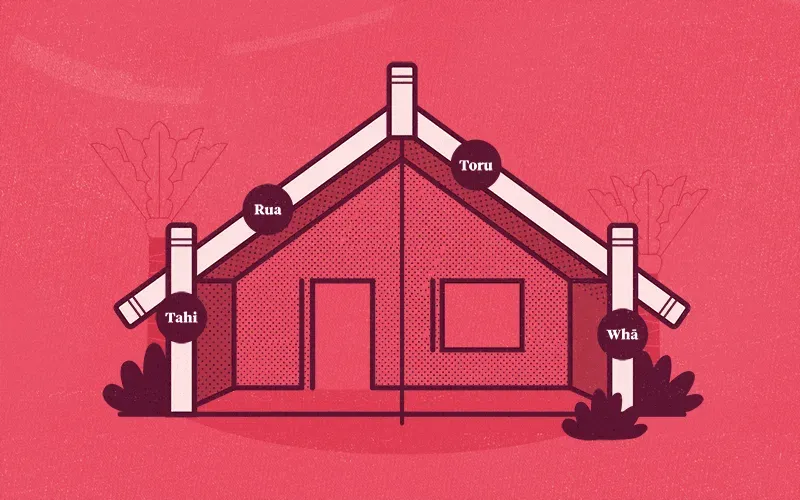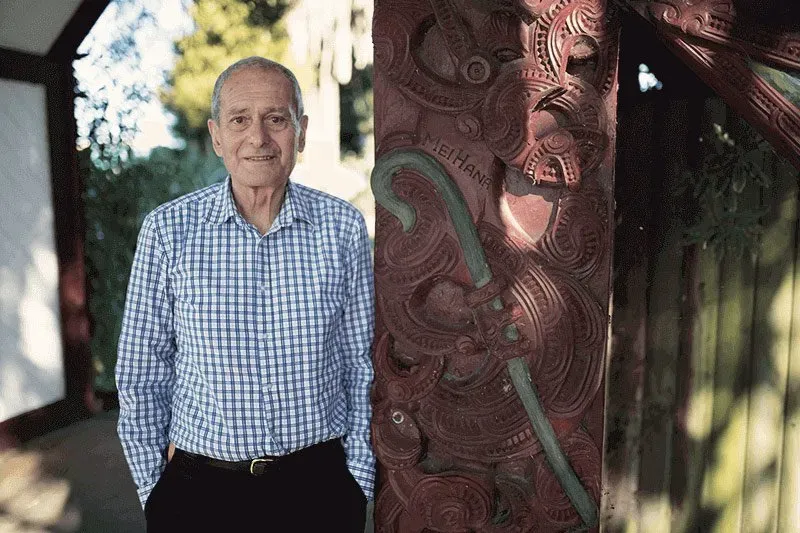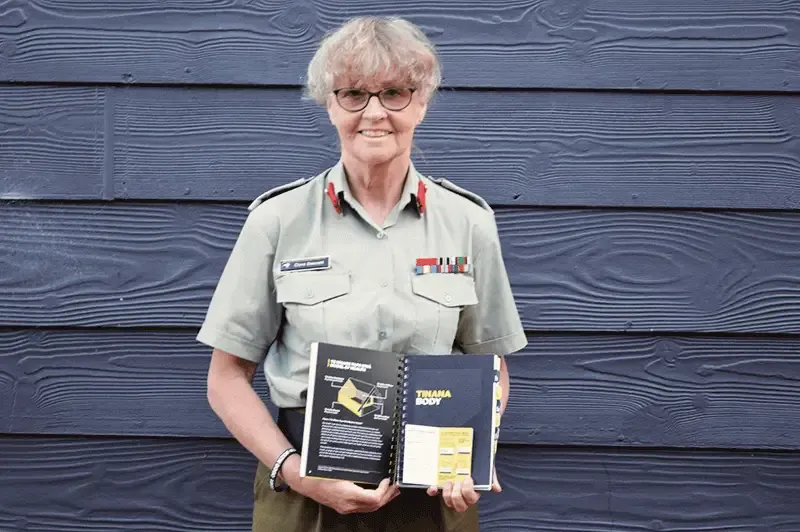Well in every way – Te Whare Tapa Whā
By MAS Team
The concept of Te Whare Tapa Whā is about maintaining not just physical and mental health but also social and spiritual connections in order to promote good health.
In the early 1980s, a psychiatrist based in Palmerston North devised a holistic approach to treating his patients' health.
Little did he know almost four decades later, his concept would be picked up by Aotearoa's health sector and would be implemented across the public sector, private businesses and community organisations.
That concept is Te Whare Tapa Whā and its creator, MAS Member Sir Mason Durie (Rangitāne, Ngāti Kauwhata, Ngāti Raukawa), says he's "surprised – in a good way" to see it continue to resonate today.

Whenua
Whenua is our connection to the land. It's soil, plants, animals and people – tangata whenua. It's the earth through which you are connected to your tūpuna/ancestors. Whenua is a place of belonging, and it's comforting that it is never too far away.
It's about how your body grows, feels and moves and how you care for it. Nourishing and strengthening your physical wellbeing helps you to cope with the ups and downs of life. Feeling physically well helps you feel mentally well.
Taha wairua (spiritual health)
Your spiritual essence is your life force – your mauri. This is who and what you are, where you have come from and where you are going. For some, wairua is the capacity for faith or religious beliefs or having a belief in a higher power. For others, wairua is an internal connection to the universe or the sacred.
Taha hinengaro (mental health)
Your mind, heart, conscience, thoughts and feelings. It's about how you feel as well as how you communicate and think.
Who makes you feel like you belong, who you care about and who you share your life with. Whānau is about extended relationships – it's not just your immediate relatives. It's your friends, hoamahi (colleagues), community and the people you care about.
While he was working as a psychiatrist at Palmerston North Hospital in the 1970s, Sir Mason became increasingly disillusioned with the narrow clinical approach to treating patients. In his view, the traditional focus was on dealing with the symptoms of a health problem without considering underlying issues that might lie behind the symptoms.
On ward rounds, Sir Mason would discuss with his colleagues the concurrent mental health problems of the patients admitted with heart, respiratory and other physical issues. He'd also see patients for psychiatric treatment and note they were often in poor physical shape.
"The mainstream approach was a very siloed one. It's not that physicians didn't want to do their best for the patient – it was more a failing with a system where everyone operated in disciplines or specialties. Good health does not just depend on a single specialist service. There's a bigger picture to think about.
"I suppose what I was doing was aiming towards a focus on overall wellbeing rather than the narrower goal of recovery and removing symptoms. That's important but it's not an endpoint.
Sir Mason's Te Whare Tapa Whā model refers to a wharenui (or meeting house) to illustrate the four dimensions of wellbeing: taha tinana (physical health), taha hinengaro (mind), taha whānau (family) and taha wairua (the spiritual dimension).With four walls, the wharenui is a symbol of these four dimensions.
All four sides are important for keeping the wharenui upright, and if one of the dimensions is missing or damaged, a person may become unbalanced and subsequently unwell, affecting all other dimensions of their health.
Sir Mason says the concept is closer to the modern concept of wellbeing and holistic health.
"In modern terms, the idea of wellness has caught on in a big way, which is not just about removing the symptoms but treating the disorder to help a person be well."

Sir Mason Durie
Sir Mason first presented the concept of Te Whare Tapa Whā at a talk at Palmerston North Hospital in 1982, and he says the initial reaction from the roomful of doctors was one of "disbelief".
It suggested a holistic way of thinking about health that was radical for its era. Some health professionals saw it as a challenge to the fundamental approach to patient diagnosis and treatment they had used all their working lives.
The most unconventional part of Te Whare Tapa Whā was the idea that a person's spirituality has a role in their health; it was a dimension traditionally overlooked by health practitioners.
Sir Mason says the meaning of spirituality for an individual is very personal and doesn't necessarily relate only to religious beliefs. It was an area he found had significant resonance for his Māori patients who valued te reo, heritage and the wider environment.
"I had a number of Māori patients who would talk about things that linked much more to spirituality than to the other aspects."
Despite early resistance, Sir Mason perservered. He continued to discuss the approach with colleagues, used it in his work with a research project being undertaken by the Māori Women's Welfare League and later presented the model at a Māori health hui in 1984.
Soon the idea gained support outside Māori health, with the concept being picked up internationally, although different countries interpreted the model in different ways.
"I initially developed it with Māori in mind, but it was written much more universally. Spiritually, for example, has very different connotations for different cultures and different countries. Some people see it as a religious faith-based approach, and other people in different countries see it in their own way.
"The concept of whānau is also seen differently from one culture to another. The wider overseas interpretation recognises the four dimensions of whare tapa whā but does not simply mimic the Māori viewpoint. Instead each culture brings in their own aspect of spirituality and what constitutes a sound, healthy family.
"It is also important to remember that a house is built on land – it is grounded on whenua and refreshed by the sky above."

Colonel Clare Bennett, NZDF's Director of Integrated Wellness
Almost four decades on, Te Whare Tapa Whā is widely used throughout the health sector and has been adopted by government agencies include Whānau Ora, the Ministry of Education and the New Zealand Defence Force (NZDF).
In addition to physical and technical training, NZDF recruits are given resilience and mindfulness-based attention training, which helps them gain and maintain the positive mental health required in the job.
Colonel Clare Bennett, NZDF's Director of Integrated Wellness says Te Whare Tapa Whā has provided a model to look beyond just physical resilience, which helps the organisation's people stay healthy and cope with the pressures of the job.
"We take away a lot of the traditional support networks when recruits come into the organisation, and it can be difficult by the nature of the roles where we ask our people to periodically take on tasks that can be more stressful than many normal occupations and require people to be resilient and able to bounce through times of emotional challenge."
Te whare tapa whā was introduced in NZDF training more than five years ago and has resonated with a workforce that is almost 15% Māori.
"It's really important to use a model that reflects our culture and representation of our people," Clare says.
Bringing this holistic perspective to health has helped shift the stigma around mental health, and Clare says younger recruits, in particular, are more willing to admit when they're struggling mentally and to seek help.
"We have a self-assessment tool based on Te Whare Tapa Whā to get people thinking about their health in a holistic way. While not all factors that impact our health are always in our control, there is a range of things that we can do to help keep us healthy and performing at the top of our game," she says.

Taha hinengaro, your mental and emotional wellbeing, needs to be taken care of. It's about how you feel, communicate and think.

Taha tinana is your physical wellbeing. It's about how your body grows, feels and moves and how you care for it. It's important to take care of and nurture.

Taha wairua is who and what you are, where you have come from and where you are going. Your spiritual essence if your life force – your mauri.